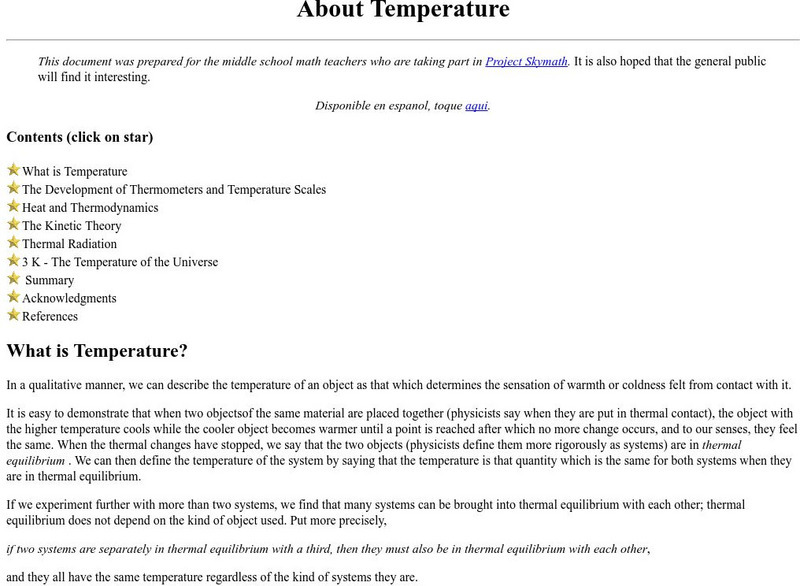American Chemical Society
Middle School Chemistry: Can Gases Dissolve in Water?
Use this interactive animation to find out about whether or not gases dissolving in water.
Center for Literacy and Disability Studies, University of North Carolina at Chapel Hill
Tar Heel Reader: Liquids: A Science Curriculum Resource Support
Read about solids, liquids, and gases, and find out about the phases of matter.
Center for Literacy and Disability Studies, University of North Carolina at Chapel Hill
Tar Heel Reader: Forms of Water
Find out how water can exist in the three different pahses of matter.
CPALMS
Florida State University Cpalms: Florida Students: Your Ice Cream Is Moving
Learn how states of matter are dependent on an object's average kinetic energy.
US Environmental Protection Agency
Epa: Carbon Monoxide (Co)
This page gives the sources of carbon monoxide along with health effects and recommendations for CO levels in homes.
National Institute on Drug Abuse
National Institute on Drug Abuse: Inhalants
This resource provides information about the abuse and dangers of inhalants.
TeachEngineering
Teach Engineering: Solid, Liquid or Gas?
Students are given a variety of materials and asked to identify if each material as a solid, liquid or gas. They use their five senses - sight, sound, smell, texture and taste - to identify the other characteristics of each item.
Chem Tutor
Chem Tutor: Chemistry: States of Matter
This lesson focuses on the states of matter: solids, liquids, and gases. It also discusses the Kinetic Theory of Matter, Thermodynamics, Triple point, Phase Change Graphs and the Heating Curve of Water. It provideds adrawing of a heating...
CK-12 Foundation
Ck 12: Plix Series: Transformations: Compressibility
[Free Registration/Login Required] Observe what happens to volume as pressure is changed, and then answer a challenge question after the activity.
CK-12 Foundation
Ck 12: Plix: Solid, Liquid and Gas
[Free Registration/Login Required] In this interactive you will move the red dot below each flask to observe how particles move in each different phase of water. You will need a sign-in to access this media, but it will be well worth...
CK-12 Foundation
Ck 12: Plix Series: Piston Pressure: Boyle's Law
[Free Registration/Login Required] In this interactive activity, discover the relationship between pressure and volume. After the activity, answer one challenge question about the topic.
CK-12 Foundation
Ck 12: Plix Series: Charles' Law: Gas Balloon
[Free Registration/Login Required] Observe what happens to the volume of a balloon with a change in temperature. After the activity, answer a multiple-choice, challenge question.
CK-12 Foundation
Ck 12: Plix Series: Gay Lussac's Law
[Free Registration/Login Required] Increase the heat in the virtual container, and observe what happens to the internal pressure.
CK-12 Foundation
Ck 12: Physical Science: Amontons' Law
[Free Registration/Login may be required to access all resource tools.] Amontons' law and the relationship between the temperature and pressure of a gas.
NASA
Nasa Star Child: Stars
This page details the life cycle of a star, and includes information on medium-sized and massive stars, plus a glossary and a question.
University Corporation for Atmospheric Research
Ucar: About Temperature
This site from the University Corporation of Atmospheric Research provides a lengthy page covering numerous topics including the difference between heat and temperature, the use of different temperature scales, thermal expansion, how a...
University of Florida
Chem. 2041 Lecture Notes: The Forces Between Molecules
A discussion of the variety of forces which hold molecules together. The relative strengths of these forces for the various states of matter is discussed. The effect of such forces on the boiling points and other phase change...
Museum of Science
The Atom's Family: Mighty Molecules
In this activity, students construct models of molecules using marshmallows and gum drops.
University of California
Ucsb Chemistry and Biochemistry: Models Matter
Matter of any type can be subdivided into particles that are too small to see, but even then the matter still exists and can be detected by other means. Students will participate in hands-on activities to prove that matter is made up of...
Other
Garden With Insight: Vapor Pressure in the Garden
Basic information about the role of vapor pressure in the garden. In addition, a free garden simulator can be downloaded in which various quantities can be measured.
Michael Blaber, PhD
Florida State University: Intermolecular Forces
This article from the Florida State Univeristy provides good information on the various intermolecular forces, including nice diagrams.
Chem Tutor
Chem Tutor: Dissolving Gases Into Liquids
Description of the factors influencing gas solubility. This site also provides other chemistry related questions. Topics include dissolving solids into liquids, concentration, and stoichiometry.
Physics Aviary
Physics Aviary: Practice Problems: Pressure Based on Temperature Problem
This program asks students to determine the pressure in a sample of gas based on the temperature of the system.
Physics Aviary
Physics Aviary: Practice Problems: Pressure Based on Speed Problem
This program asks students to determine the pressure in a sample of gas based on the rms speed of the particles.



















